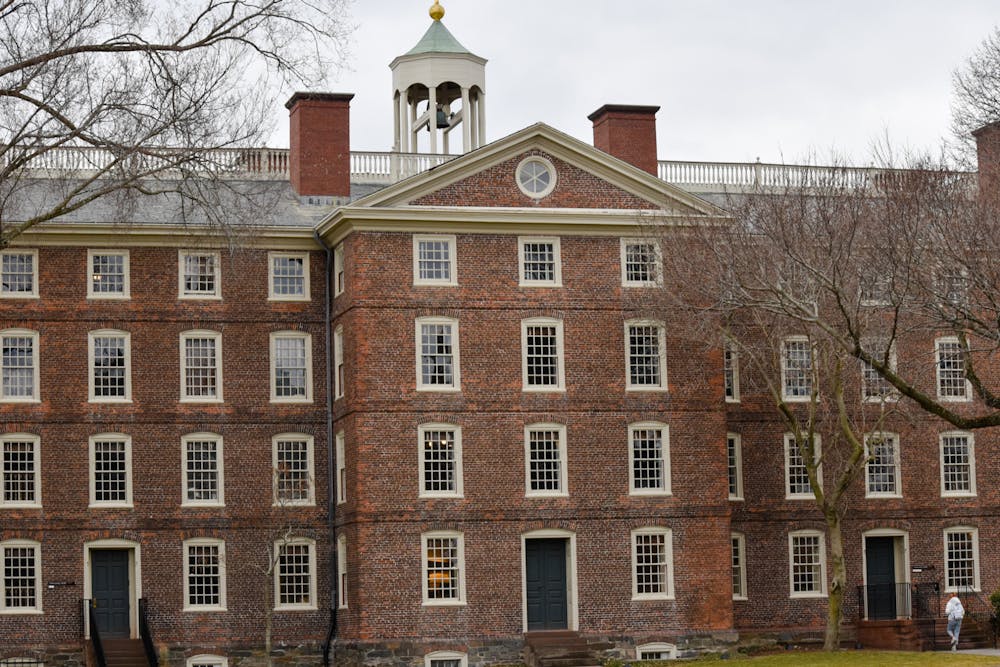At Tuesday’s faculty meeting, President Christina Paxson P’19 P’MD’20 offered updates on a report provided to her office by a working group charged with reviewing the University’s gifts and grants processes.
The group was established last spring to “review existing practices for accepting gifts and grants,” she said in the meeting.
According to Paxson, the group’s first recommendation was to “amend the Openness In Research Policy” — which states the University’s commitment to freedom of research — to include a clause ensuring that the University’s grant and gift acceptance policies align.
“A grant will not be accepted if the intended purpose of the Grant and/or being associated with the grant-making organization could inflict significant damage on the University’s reputation,
standing or integrity or be contrary to University values,” the proposed clause reads.
“In some cases, however rare, association with a grant-making organization
could pose a threat to Brown’s reputation or be inconsistent with Brown’s values,” the report reads. “Having different ethical standards for the acceptance of gifts and grants — both of which support educational and scholarly activities — does not make sense.”
Paxson used hypothetical scenarios surrounding the now-deceased banker and sex offender Jeffrey Epstein as a “thought experiment” to run through the University’s gift acceptance policy and proposed updates to it.
“If we had a proposed gift from somebody with that … reputation, we would certainly not accept the gift,” Paxson said, referring to Epstein.
In 2019, the University placed a fundraising administrator on leave due to his previous fundraising from Jeffrey Epstein at the Massachusetts Institute of Technology, a now-deceased sex offender and banker. The administrator resigned from the University in early 2020. Brown has never received any funds from Epstein, The Herald previously reported.
The report from the working group also recommended the establishment of a Gifts/Grant Review Committee to “review grants and gifts that may not be aligned with the University’s stated … policies,” according to the meeting agenda.
This review process would not apply to grants from states agencies, federal agencies or “places we accept grants from regularly,” Paxson said.
The group’s final recommendation was that “the University should develop a policy and practices for the acceptance of anonymous gifts and grants from donor-advised funds.”
According to Paxson, donor-advised funds are essentially “philanthropic savings accounts” where the donor “get(s) the tax break right away” before the money is redistributed.
Paxson said that the University uses these accounts in their own philanthropic endeavors. When donors place money into these funds, she added, they “can recommend who to give that money to.”
Paxson emphasized the importance of policies reviewing donor-advised funds. “This would be somebody like Jeffrey Epstein saying ‘okay, I’m going to give money to a donor advised fund, recommend that it go to a certain program, and request to remain anonymous,’” she said during the meeting.
Discussing grant policies more broadly, Paxson noted that she “worries about the politicization of our decisions to accept research grants because it’s equivalent to censoring faculty.”
Interim Provost Larry Larson also discussed progress on improving hiring processes and proposal review timelines for research, among other administrative aspects. He additionally noted that an “external assessment” of the University’s research administration had been completed in December.
He also provided updates on the search for the new permanent dean of the Graduate School following Professor of Medical Science Andrew Campbell’s decision to step down from the deanship in June of last year.
The task, Larson explained, is challenging due to “an incredibly heterogeneous set of graduate programs around the campus.” He added that the search committee for the dean “want(s) the experience of our graduate students to be uniformly excellent across campus.” The committee will contact candidates in the coming weeks and will name a dean by May, Larson said.
Paxson also announced that the Data Science Institute, approved at last month’s faculty meeting, was approved by the Corporation, the University’s highest governing body, at its last meeting.
Memorial minutes were additionally held in honor of Anthony Lancaster, professor emeritus of economics, and Bryan Shepp, professor emeritus of psychology and cognitive and linguistic sciences, who both recently passed away.

Owen Dahlkamp is the managing editor of newsroom on The Herald's 135th Editorial Board, overseeing the paper's news operations. Hailing from San Diego, CA, he is concentrating in Political Science and Cognitive Neuroscience with an interest in data analytics. In his free time, you can find him making spreadsheets at Coffee Exchange.





